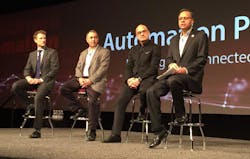Rockwell Automation: An Industrial Software Company
You’ve probably heard the 2014 quote by Jeff Immelt of GE that “if you woke up as an industrial company today, you will wake up as a software and analytics company tomorrow.” In 2016, I heard much the same sentiment from Rockwell Automation during its Automation Perspectives event in Atlanta. This event is part of Rockwell Automation’s annual Automation Fair.
During an interview about disruptive technologies with Sujeet Chand, Rockwell Automation’s senior vice president of advanced technology and chief technology officer, he noted that Rockwell Automation has been undergoing dramatic changes over the past several years. “We’re now an industrial software company,” he said. “All value add today is in software or firmware. Hardware is still important, however, so that’s why we still make custom ASICS to have control over the hardware lifecycle.”
But software is where the most disruptive changes are occurring, Chand said, pointing to tech advances such as mobility, cloud, machine learning and augmented reality that are playing an increasingly bigger role in manufacturing technology developments. “What these technologies do is bring value faster for the user,” said Chand.
The result of these technology shifts for Rockwell Automation, Chand said, is that we “used to worry about connecting with legacy systems, but now we focus more on fit for purpose. Automation technology, in general, is going in this direction with legacy system integration taking place in the background” in a way that’s transparent to the user. He pointed to Rockwell Automation’s announcement of FactoryTalk TeamOne (formerly referred to as Project Stanton) as an example of this.
TeamOne, which is available from Rockwell Automation at no charge, is a mobile device application for iOS and Android designed to improve activity while people are at work. Workers can send notes to each other to direct work actions, ranging from notifications to check a machine or system to creating “incidents” requiring action and allowing for the attachment of documents and pictures. Rockwell Automation’s Kyle Reissner pointed out during a demonstration of TeamOne that use of the app does not require any special IT allowances or clearance, since it does not require any servers or pre-bought devices. Reissner added that the app ensures no unintended connections take place and that no data leaves the facility.
Chand also referenced the demonstration of Shelby at the Automation Perspectives event. Shelby is a Siri or Cortana-like voice-activated application that lets users discover, display and connect with devices and data in an automated system. The Shelby project started in February of 2016, Chand said, adding that phase one of the project—like other new Rockwell Automation technology developments—is focused on integrating it “with our own products. Phase two will focus on bringing connectivity to legacy devices” from other suppliers. He expects Shelby to expand into third party interaction in time for Rockwell Automation’s TechEd event in June 2017.
Further underscoring Rockwell Automation’s shift toward a greater emphasis on software, Chand said, “We’ve hit the inflection point for IT/OT convergence. Within two years, most companies will have to start implementing their version of connected enterprise to stay competitive.”
About the Author
David Greenfield, editor in chief
Editor in Chief

Leaders relevant to this article:

